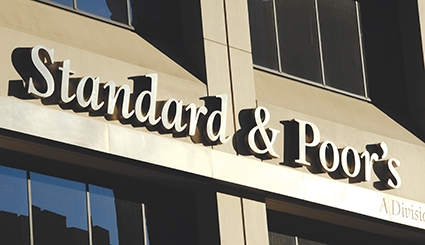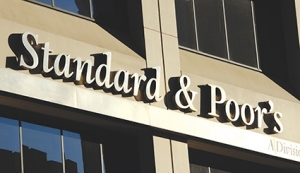S&P Publishes Georgia’s Banking Industry Risks Report
American financial services company Standard & Poor’s (S&P) Ratings Services has published a new report on the key risks for the Georgian banking system.
S&P is a division of McGraw Hill Financial that publishes credit ratings, financial research and analysis on stocks and bonds. The company aims at bringing transparency and comparability to financial markets worldwide. Through ratings and research it assists investors and other institutions to manage risk.
According to the report ‘Banking Industry Country Risk Assessment: Georgia’ (BICRA), Georgia's economic risk trend as stable. Georgia's economy has successfully absorbed a number of external shocks, and demonstrated its ability to adjust to external challenges. However, the economy is in a correction phase, and credit costs are expected to remain a high 2.7%-3.0% of average gross loan book over the next 12 months.
The industry risk trend for Georgian banks is stable. The banking sector's risk appetite will remain aggressive, mostly driven by a high share of foreign-exchange lending, and the heavy reliance on external funding will continue.
Georgia remains a low-income country, with GDP per capita at about USD 3,242 in 2015. The Georgian economy remains volatile and highly sensitive to developments in domestic politics on the back of the general elections, which are due in autumn 2016. Real GDP growth is expected for Georgia to average about 3.0% over 2015-2018.
Dollarization in the economy is high, and therefore constrains monetary policy efficiency. Approximately 60% of deposits are in foreign currency and the IMF estimates 90% of foreign currency borrowings are unhedged.
The banking sector's credit costs increased in 2015 and may remain elevated throughout 2016.
Banking services in the Georgian economy are underpenetrated, with private-sector credit to GDP amounting to only about 50% (2015 estimate), higher than in Azerbaijan (37%), Kazakhstan (34.1%), and Uzbekistan (13.9%), but lower than in Russia (61.6%).
Georgia's low financial intermediation corresponds to generally low wealth and, consequently, low debt service capacity among the population, seen in low GDP per capita and the still-high unemployment rate of 14.75% in 2015. Household leverage remains low, but on an upward trend, increasing to an estimated 26.1% of GDP in 2015, from 12.5% in 2011.
Demand for credit in the corporate sector is volatile and highly sensitive to political and economic uncertainty in Georgia. It is positive that the banking sector's exposure to the real estate and construction sector accounts for less than 10% of the system's total loan book. Major borrowing industries are trade, energy, food production, and agriculture.
The Georgian banking industry compares well with those of regional peers in terms of governance and transparency. This stems in part from most banks' ownership by foreign investors, including the two largest, Bank of Georgia and TBC Bank (both listed on London Stock Exchange), which encourages higher standards of information disclosure and facilitates prudent corporate governance.
Georgia is the only country in the region where the outlooks on all the banks are stable, both for bank-specific reasons and because of a relatively stable macroeconomic environment.
Peer BICRA Scores
S&P’s assessment of Georgia's economic resilience reflects higher risks than for other countries in the same BICRA group, owing to Georgia's relatively low wealth, high external vulnerabilities, and political uncertainty. At the same time, Georgia, being in a correction phase, finds the risk of economic imbalance now lower than for its peers.
Georgia has a better institutional framework than its peers because of the proactive approach of the previous government in reducing corruption and opening the banking sector up more to external investors. At the same time, Georgia's system-wide funding as weaker than that of its peers highlights the country's reliance on external funds and its narrow and shallow domestic capital markets.
Ana Akhalaia











